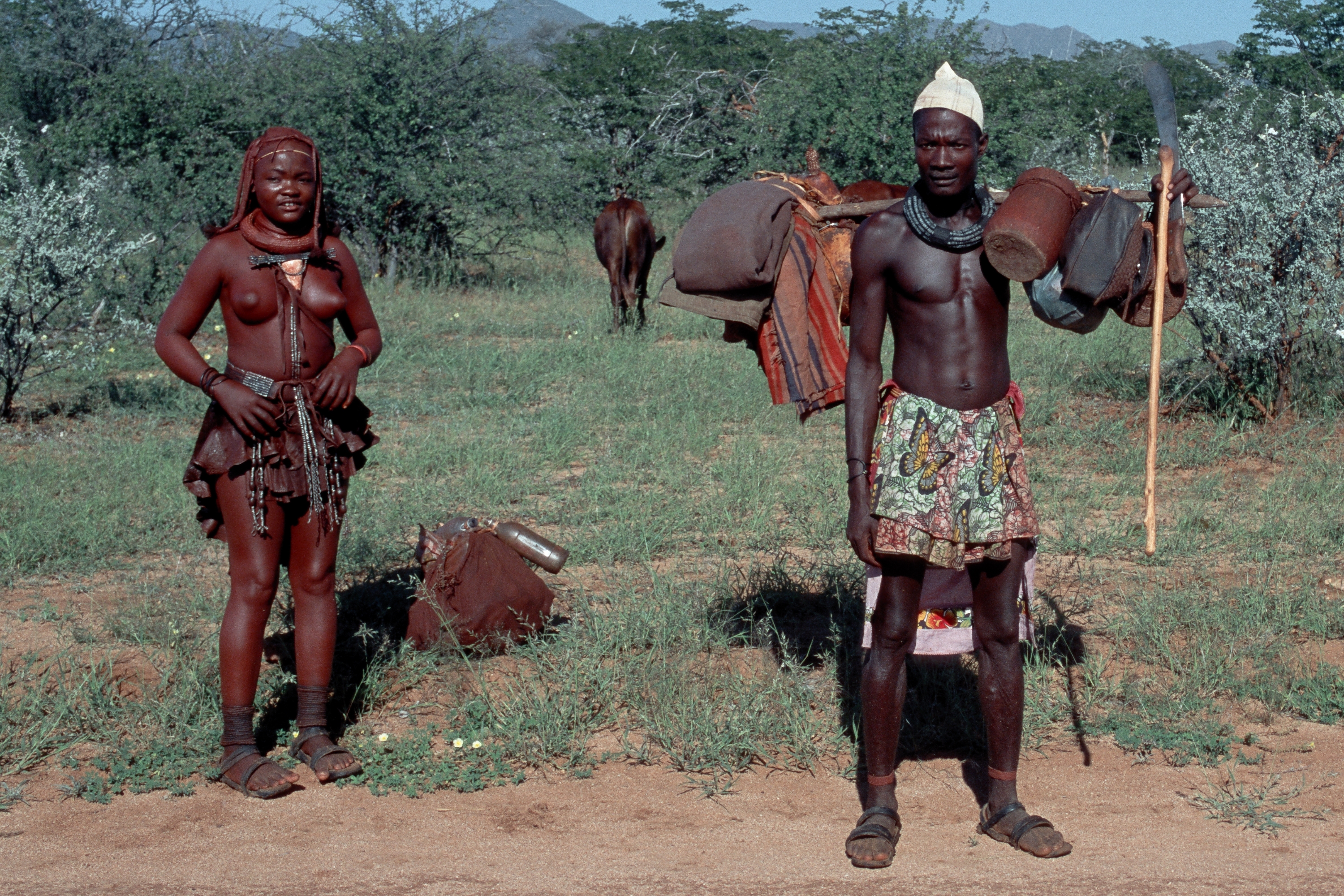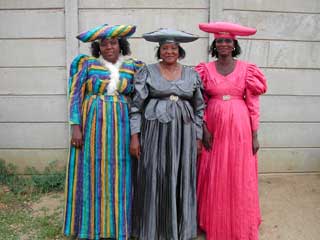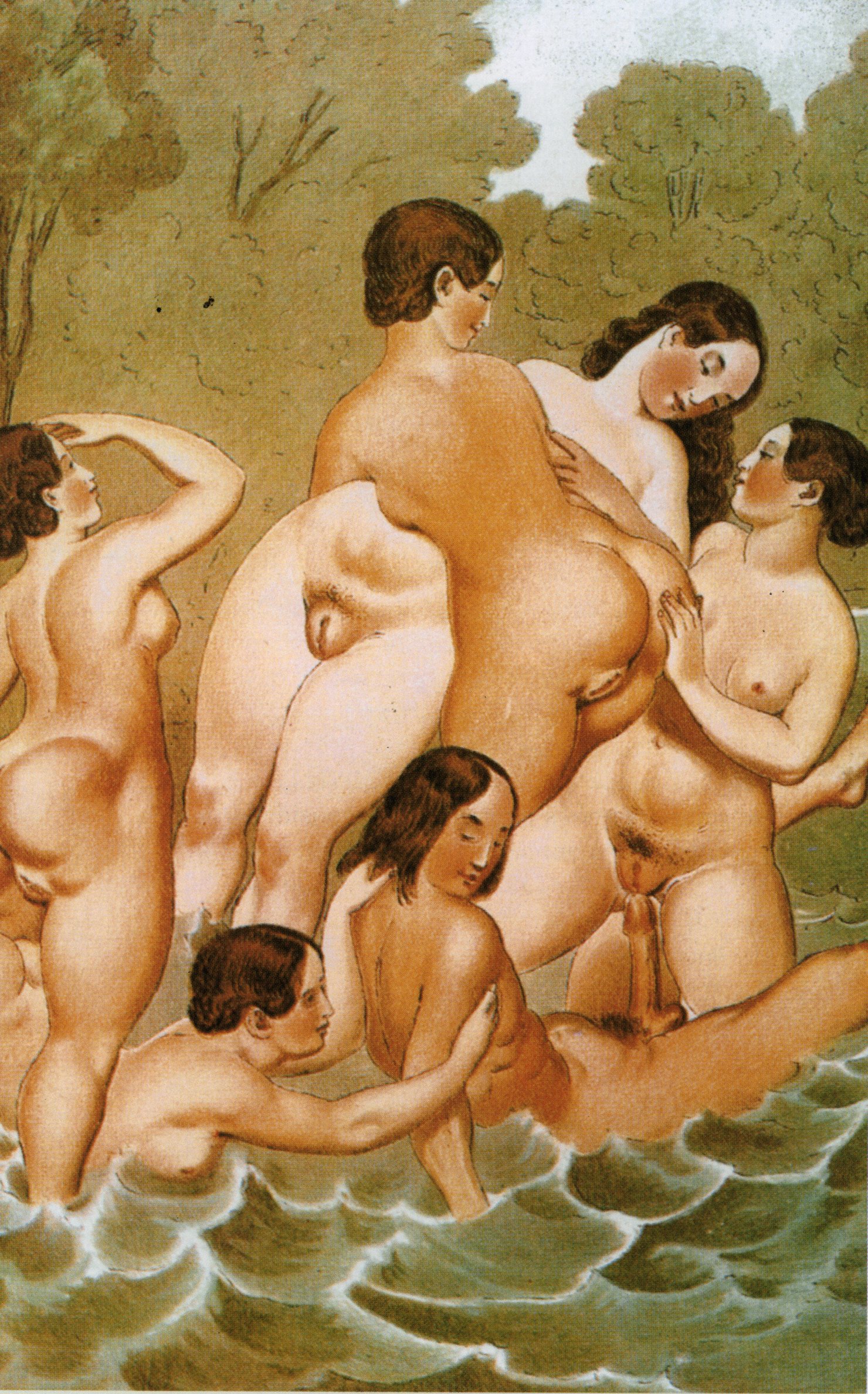|
Okujepisa Omukazendu
() is the polyamorous sexual practice of hospitable "wife-sharing" among the nomadic OvaHimba and OvaZemba peoples of Namibia's Kunene and Omusati regions. According to the practice, a man welcomes a male guest (typically a family member or best friend, more rarely an important visitor, and never a stranger or tourist) to his home by allowing the visitor to sleep in the man's bed and have sex with his wife for the night, while the man sleeps in another hut or outside. The woman has little agency in the arrangement. The opposite arrangement, whereby a woman chooses a female friend for her husband to have sex with, exists, but is rare. Women surveyed in rural North Kunene reported that their husbands lend them to friends in hopes of later having sex with the friends' wives. The practice has been described as "generations-old", "centuries-old", and "ancient". The practice's justifications include belief that it deepens friendship and prevents promiscuity and jealousy in both sexes. ... [...More Info...] [...Related Items...] OR: [Wikipedia] [Google] [Baidu] |
HIV/AIDS In Namibia
HIV/AIDS in Namibia is a critical public health issue. HIV has been the leading cause of death in Namibia since 1996, but its prevalence has dropped by over 70 percent in the years from 2006 to 2015. While the disease has declined in prevalence, Namibia still has some of the highest rates of HIV of any country in the world. In 2016, 13.8 percent of the adult population between the ages of 15 and 49 are infected with HIV. Namibia had been able to recover slightly from the peak of the AIDS epidemic in 2002. At the heart of the epidemic, AIDS caused the country's live expectancy to decline from 61 years in 1991 to 49 years in 2001. Since then, the life expectancy has rebounded with men living an average of 60 years and women living an average of 69 years This increase in life expectancy is attributed to better sexual health education and an increased use of antiretroviral therapy in the infected population. Aid organisations and the Namibian government have worked together to increas ... [...More Info...] [...Related Items...] OR: [Wikipedia] [Google] [Baidu] |
Women's Rights In Namibia
Human rights in Namibia are currently recognised and protected by the Namibian constitution formed in 1990 by a 72-seat assembly. The assembly consisted of differing political parties. After a draft, the constitution was agreed upon by all members of the seven political parties involved. 21 March 1990 marks the first day Namibia operated under the Constitution and also marks the recognition of Namibia as an independent nation. Chapter 3 of the constitution entitled Fundamental Human Rights and Freedoms, also referred to as the Bill of Rights, outlines the human rights of all Namibian citizens. Overview of the Bill of Rights The third chapter in the constitution recognises several human rights. Article 5, the first in the chapter, stipulates that all rights outlined by the constitution must be observed by all facets of the Namibian government. The following articles in the chapter, 6-25, state these rights and are outlined below. The opening articles state that all persons hav ... [...More Info...] [...Related Items...] OR: [Wikipedia] [Google] [Baidu] |
Culture Of Namibia
Culture in Namibia is a blend of many different people and its culture and customs have absorbed both African and European elements and fused them into a blend of the two. Although the country is urbanising rapidly, a majority of Namibians still live in rural areas and lead largely impoverished lives. It is among these people, however, that cultural tradition survive most strongly. One of the sparsest populated countries in the world, Namibia's different cultures span an impressively diverse population, from the Bantu-speaking Ovambo and Herero tribes (the latter of which are admired for their colorful Victorian dress) to the Damara minorities and nomadic San. German colonisation left its own imprint on Namibia, with German being a widely spoken language today and German architecture and cuisine featuring prominently. Namibia's diverse and, at times, harsh climate has contributed to its colourful history. Population Namibia has the second- lowest population density of an ... [...More Info...] [...Related Items...] OR: [Wikipedia] [Google] [Baidu] |
Women In Namibia
Women in Namibia face challenges in women's health, their health, Domestic violence, gender based violence, and access to education. The government of Namibia is taking steps to provide women with equal rights to a degree that is largely unparalleled in Sub-Saharan Africa, including the promise of gender equality and increased parliament representation in the Constitution of Namibia, Namibian constitution. Women currently serve in nearly half of all seats in parliament and the first female Prime minister, Prime Minister was elected in 2015. Health HIV/AIDS is largely prevalent within Namibia. HIV-related deaths reached its peak in 2004, when 12,000 people died, but has since declined to around 2,900 deaths in 2021. The socioeconomic status of women remains a significant indicator of HIV status. Of the poorest women in Namibia, the HIV prevalence rate is at 21.4%, compared to the richest households with an HIV prevalence rate of 3.7%. Large strides have been made in the last de ... [...More Info...] [...Related Items...] OR: [Wikipedia] [Google] [Baidu] |
Swinging (sexual Practice)
Swinging (earlier commonly known as, wife-swapping, husband-swapping, or partner-swapping) is a sexual activity in which both singles and partners in a committed relationship sexually engage with others for recreational purposes. Swinging is a form of non-monogamy. People may choose a swinging lifestyle for a variety of reasons. Practitioners cite an increased quality and quantity of sex. Some people may engage in swinging to add variety into their otherwise conventional sex lives or due to their curiosity. Some couples see swinging as a healthy outlet and means to strengthen their relationship. The term was introduced by the media in the United States during the 1950s to describe this emerging phenomenon. Swinging, or its wider discussion and practice, is regarded by some as arising from the freer attitudes to sexual activity after the sexual revolution of the 1960s, the invention and availability of the contraceptive pill, and the emergence of treatments for many of the sex ... [...More Info...] [...Related Items...] OR: [Wikipedia] [Google] [Baidu] |
Cuckold
A cuckold is the husband of an adulterous wife (or partner for unmarried companions); the wife of an adulterous husband is a cuckquean. In biology, a cuckold is a male who unwittingly invests parental effort in juveniles who are not genetically his offspring. A husband who is aware of and tolerates his wife's infidelity is sometimes called a wittol or wittold. The slang term bull refers to the dominant man who has relations with the cuckold's partner. History of the term The word ''cuckold'' derives from the cuckoo bird, alluding to its brood parasitism, or tendency to lay its eggs in the nests of other birds. The association is common in medieval folklore, literature, and iconography. English usage first appears about 1250 in the medieval debate poem '' The Owl and the Nightingale''. It was characterized as an overtly blunt term in John Lydgate's ''The Fall of Princes'', . William Shakespeare's writing often referred to cuckolds, with several of his characters suspe ... [...More Info...] [...Related Items...] OR: [Wikipedia] [Google] [Baidu] |
Infidelity
Infidelity (synonyms include non-consensual non-monogamy, cheating, straying, adultery, being unfaithful, two-timing, or having an affair) is a violation of a couple's emotional or sexual exclusivity that commonly results in feelings of anger, sexual jealousy, and rivalry. What constitutes infidelity depends on expectations within the relationship. In marital relationships, exclusivity is commonly assumed. Infidelity can cause psychological damage, including feelings of rage and betrayal, depression, low sexual and personal confidence, and even post-traumatic stress disorder. People of both sexes can experience social consequences if their act of infidelity becomes public, but the form and extent of these consequences can depend on the gender of the unfaithful person. Incidence After the Kinsey Reports came out in the early 1950s, findings suggested that historically and cross-culturally, extramarital sex has been a matter of regulation more than sex before marriage. The ... [...More Info...] [...Related Items...] OR: [Wikipedia] [Google] [Baidu] |
Droit Du Seigneur
('right of the lord'), also known as ('right of the first night'), sometimes referred to as ''prima nocta'', was a supposed legal right in medieval Europe, allowing feudal lords to have sexual relations with any female subject, particularly on her wedding night. There are many references to the alleged custom throughout the centuries. Terminology The French expression translates as "right of the lord", but modern French usage prefers (, from , 'leg') or, more commonly, (, from , 'thigh'). The term is often used synonymously with , Latin for "right of the first night". Ancient times The Greek historian Herodotus mentions a similar custom among the Adyrmachidae in ancient Libya: "They are also the only tribe with whom the custom obtains of bringing all women about to become brides before the king, that he may choose such as are agreeable to him." When the plebeians of the Etruscan city of Volsinii rebelled against the aristocrats in 280 BC, "They took their wives for ... [...More Info...] [...Related Items...] OR: [Wikipedia] [Google] [Baidu] |
Human Rights In Namibia
Human rights in Namibia are currently recognised and protected by the Constitution of Namibia, Namibian constitution formed in 1990 by a 72-seat assembly. The assembly consisted of differing political parties. After a draft, the constitution was agreed upon by all members of the seven political parties involved. 21 March 1990 marks the first day Namibia operated under the Constitution and also marks the recognition of Namibia as an independent nation. Chapter 3 of the constitution entitled Fundamental Human Rights and Freedoms, also referred to as the Bill of Rights, outlines the human rights of all Namibian citizens. Overview of the Bill of Rights The third chapter in the constitution recognises several human rights. Article 5, the first in the chapter, stipulates that all rights outlined by the constitution must be observed by all facets of the Politics of Namibia, Namibian government. The following articles in the chapter, 6-25, state these rights and are outlined below. The ... [...More Info...] [...Related Items...] OR: [Wikipedia] [Google] [Baidu] |
Polygamy In Namibia
While polygamous marriages are not legally recognized under the civil marriage laws of Namibia, a bill was successfully passed in 2003, based on Recognition_of_Customary_Marriages_Act,_1998, the model in South Africa, which recognizes polygamous unions under customary law; affording a generous amount of benefits to polygamous unions, ranging from inheritance rights to child custody. It has been estimated that nearly one in seven women in Namibia live in polygamous relationships, which has resulted in large numbers of unmarried men. Since May 2009, a debate concerning legalizing civil polygamous marriages has been ongoing throughout the parliament in Namibia. The bill has faced both praise and fierce opposition. There have also been past attempts to outlaw polygamous marriages (including under customary law), which have received about an equal reaction. A bill that would have provided pension benefits to the spouses of a deceased polygamous president was voted down in 2004. See al ... [...More Info...] [...Related Items...] OR: [Wikipedia] [Google] [Baidu] |
Social Function
Structural functionalism, or simply functionalism, is "a framework for building theory that sees society as a complex system whose parts work together to promote solidarity and stability". This approach looks at society through a macro-level orientation, which is a broad focus on the social structures that shape society as a whole, and believes that society has evolved like organisms. This approach looks at both social structure and social functions. Functionalism addresses society as a whole in terms of the function of its constituent elements; namely norms, customs, traditions, and institutions. A common analogy called the organic or biological analogy, popularized by Herbert Spencer, presents these parts of society as human body "organs" that work toward the proper functioning of the "body" as a whole. In the most basic terms, it simply emphasizes "the effort to impute, as rigorously as possible, to each feature, custom, or practice, its effect on the functioning of a suppo ... [...More Info...] [...Related Items...] OR: [Wikipedia] [Google] [Baidu] |






